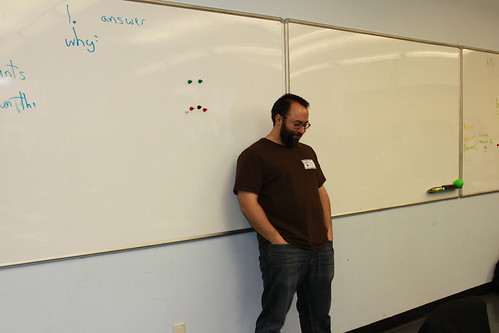EdCampNYC
New York City. It has been a while. My last visit brought me to the Steinhardt School for a conference. A city that does not have the same draw to me since the passing of a dear friend.
A far cry from SOHO, Tribeca, and the late 1990s, I find myself Uptown at The School at Columbia Univerity for the inaugural EdCampNYC. Since my first (the first) EdCamp, I have had the opportunity to attend several UnConferences and have enjoyed the experience every time.

My first concern after a mind-numbing 6am trolley ride to the bus is that I would arrive in time to post a session. Despite a one miscue on Metro, I arrived in plenty of time to post a session entitled “Who Run Bartertown? What your brain thinks about you” and enjoy coffee (!) and a light breakfast snack. Breathe. We are all friends here, after all.
First session: Kathleen Cushman provided a window into the mind of students discussing her experiences and playing video and audio clips of students. They talked about what it takes to get good at something. Opinions about homework, teaching, practice, attention, interest, and motivation–things that we know but maybe did not think that kids knew, too.
Second session: Mine. Who Run Bartertown? What your brain thinks about you. Showing my age and my niche. None of the attendees knew who ‘run Bartertown.’ We talked about preconceptions that we may have about the brain and whether it matches how we approach education. We talked about brains. Our brains listened. And they laughed.
Lunch at Tom’s Restaurant. AKA Monk’s (Seinfeld). AKA Tom’s Diner (do do doo-do do do doo-do do do do do do do do do…). I had the Lumberjack: eggs (over easy, of course), pancakes, bacon, sausage, toast, coffee (!). A steal at $9 and I left full.
Third session: @DanCallahan has mastered his “Things that Suck” format and it rocked. It forces us to think and to speak. Perhaps to defend, perhaps to plea with each other. Stand together. Or alone. Perspective. Fun.

Fourth session: Mike Ritzius and Christine Miles presented a session called “We do, do YOU?” Talking about their decisions to put their talk into action and share resources with similarly minded individuals. It is already off the ground but the plans that are on the table for expansion are impressive. It also is well worth mentioning that their willingness to collaborate, take criticism and input, and adapt their current and future plans is enviable. I am just not that open-minded.
My concerns about the day were similar to those of Dan Callahan. The problem with many of these wonderful events is that those inside the building are not those who need the most help. There are teachers trapped in buildings every day who have given up on professional development. There are those who have set aside their aspirations about growth because they have seen bad administrators come and go–eaten alive by the machine or choosing to drink the Kool-Aid.
I have said it before. Educators are some of the most amazing peoples on the planet. They are resilient and wont to hear those words that inspire again. They are sensitive and responsive to the message of EdCamps.
What are the chances that they will ever hear it?
We must become evangelists of this movement. EdCamp organizers and participants need to take the necessary steps to get their events sanctioned for PD credit. Calls for proposals need to go out so that those who never would have attended will attend–EdCamp style of course–we must also educate those individuals about what it means to ‘propose‘ an idea to an EdCamp. There are events planned through the next year. Please take that next step and make this something that will draw those who need it most.
Congratulations to the EdCampNYC team for a successful event.
by the way, everyone knows. MasterBlaster run Bartertown
 complain about the school that they attended…in the 80s. Right, Men Without Hats was awesome and your school was not. We get it. Or, Debbie Gibson was the worst, but your school rocked. Fine. #EdReform is not the time for out of context discussion and what ifs–no, really, I can help…since I have no idea what goes on in the classroom, I’ll be a good out of the box thinker. No, you will not. Go get us some chips.
complain about the school that they attended…in the 80s. Right, Men Without Hats was awesome and your school was not. We get it. Or, Debbie Gibson was the worst, but your school rocked. Fine. #EdReform is not the time for out of context discussion and what ifs–no, really, I can help…since I have no idea what goes on in the classroom, I’ll be a good out of the box thinker. No, you will not. Go get us some chips.

